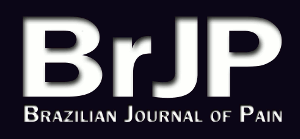Over 30 years working with the Pain Management Clinic, and after almost four years as Editor-in-Chief of a scientific journal that has been gradually improving its technical quality, I wonder how pain, as a physical symptom, changes the course of the subject’s history. Surely the patient suffers. I emphasize that pain and suffering are words that translate distinct meanings and are surrounded by an ocean of meanings. Existential suffering from what a person is, ends up creating physical pain. And physical pain causes suffering. I remember one patient I cared for earlier in my career who had her legs and two fingers amputated and lost her memory, financial status, social position, and body image. Undoubtedly, there was physical pain throughout the amputation process, and the suffering was of the order of my imagination11 Zaki J, Wager TD, Singer T, Keysers C, Gazzola V. The anatomy of suffering: understanding the relationship between nociceptive and empathic pain. Trends Cogn Sci. 2016;20(4):249-59.. There is pain when there is empathy. Fortunately, the patient did not evolve with phantom limb pain, either on the amputation stump, which could have had more dramatic consequences. All of this after a gastrointestinal infection, followed by septicemia and systemic vasculitis. The impact of this incident, however, at the peripheral and central neuronal level, is still a major challenge for researchers22 Bartkowska W, Samborski W, Mojs E. Cognitive functions, emotions and personality in woman with fibromyalgia. Anthropol Anz. 2018;75(4):271-7.,33 Chisari C, Chilcot J. The experience of pain severity and pain interference in vulvodynia patients: The role of cognitive-behavioural factors, psychological distress and fatigue. J Psychosom Res. 2017;93:83-9.. After all, any mnemic record that causes pain, suffering, and changes the natural course of the subject’s history is still hermetically treated in psychotherapy offices, and after, on average eight years comes to the care of a specialized physician44 van Hecke O, Torrance N, Smith BH. Chronic pain epidemiology and its clinical relevance. Br J Anaesth. 2013;111(1):13-8.. Contemporary ephemerality, the reason for so many absences, including that of love and compassion for others, besides the desperate search for a position of strong social representation, move the patient away from the caregiver and health professional55 Bruman Z. Vida líquida. 2ª ed. Rio de Janeiro: Jorge Zahar Ed; 2009.. Perhaps, the consequences over time of the recording in the nervous system of pain and suffering in newborns and premature infants, currently reported in publications as anxiety, abdominal pain, reduction in intelligence coefficient score, among others, alert health professionals about the importance of avoiding pain and suffering at any level66 Beggs S. Long-term consequences of neonatal injury. Can J Psychiatry. 2015 ;60(4):176-80.
7 van Ganzewinkel CJ, Been JV, Dieleman JP, Katgert T, Boelen-van der Loo T, van der Pal SM, et al. Pain coping strategies: Neonatal intensive care unit survivors in adolescence. Early Hum Dev. 2016;103(1):27-32.-88 van Ganzewinkel CJ, Been JV, Verbeek I, van der Loo TB, van der Pal SM, Kramer BW, et al. Pain threshold, tolerance and intensity in adolescents born very preterm or with low birth weight. Early Hum Dev. 2017;110(1):31-8.. I emphasize that this binomial does not make a person better but worse99 Porreca F, Navratilova E. Reward, motivation, and emotion of pain and its relief. Pain. 2017;158 (Suppl 1):S43-9.. The burdens and aggression imposed by the modern world interfere with the course of the subject’s history, depending on individual genetics, environment, social, economic, and psychic history, and are modulated by their ability to cope. So that patient-centered pain education programs have clearly aided treatment adherence and outcome1010 Bodes Pardo G, Lluch Girbés E, Roussel NA, Gallego Izquierdo T, Jiménez Penick V, Pecos Martín D. Pain neurophysiology education and therapeutic exercise for patients with chronic low back pain: a single-blind randomized controlled trial. Arch Phys Med Rehabil. 2018;99(2):338-47.. I conclude this reflection by emphasizing that caring for the body, soul, and spirit is fundamental to the correct flow of a full life: - without pain and suffering. Life is to be happy.
Durval Campos Kraychete
Scientific Editor (2016-2019)
Universidade Federal da Bahia, Salvador, BA, Brasil.
https://orcid.org/0000-0001-6561-6584
E-mail: dkt@terra.com.br
REFERENCES
-
1Zaki J, Wager TD, Singer T, Keysers C, Gazzola V. The anatomy of suffering: understanding the relationship between nociceptive and empathic pain. Trends Cogn Sci. 2016;20(4):249-59.
-
2Bartkowska W, Samborski W, Mojs E. Cognitive functions, emotions and personality in woman with fibromyalgia. Anthropol Anz. 2018;75(4):271-7.
-
3Chisari C, Chilcot J. The experience of pain severity and pain interference in vulvodynia patients: The role of cognitive-behavioural factors, psychological distress and fatigue. J Psychosom Res. 2017;93:83-9.
-
4van Hecke O, Torrance N, Smith BH. Chronic pain epidemiology and its clinical relevance. Br J Anaesth. 2013;111(1):13-8.
-
5Bruman Z. Vida líquida. 2ª ed. Rio de Janeiro: Jorge Zahar Ed; 2009.
-
6Beggs S. Long-term consequences of neonatal injury. Can J Psychiatry. 2015 ;60(4):176-80.
-
7van Ganzewinkel CJ, Been JV, Dieleman JP, Katgert T, Boelen-van der Loo T, van der Pal SM, et al. Pain coping strategies: Neonatal intensive care unit survivors in adolescence. Early Hum Dev. 2016;103(1):27-32.
-
8van Ganzewinkel CJ, Been JV, Verbeek I, van der Loo TB, van der Pal SM, Kramer BW, et al. Pain threshold, tolerance and intensity in adolescents born very preterm or with low birth weight. Early Hum Dev. 2017;110(1):31-8.
-
9Porreca F, Navratilova E. Reward, motivation, and emotion of pain and its relief. Pain. 2017;158 (Suppl 1):S43-9.
-
10Bodes Pardo G, Lluch Girbés E, Roussel NA, Gallego Izquierdo T, Jiménez Penick V, Pecos Martín D. Pain neurophysiology education and therapeutic exercise for patients with chronic low back pain: a single-blind randomized controlled trial. Arch Phys Med Rehabil. 2018;99(2):338-47.
Publication Dates
-
Publication in this collection
02 Dec 2019 -
Date of issue
Oct-Dec 2019

